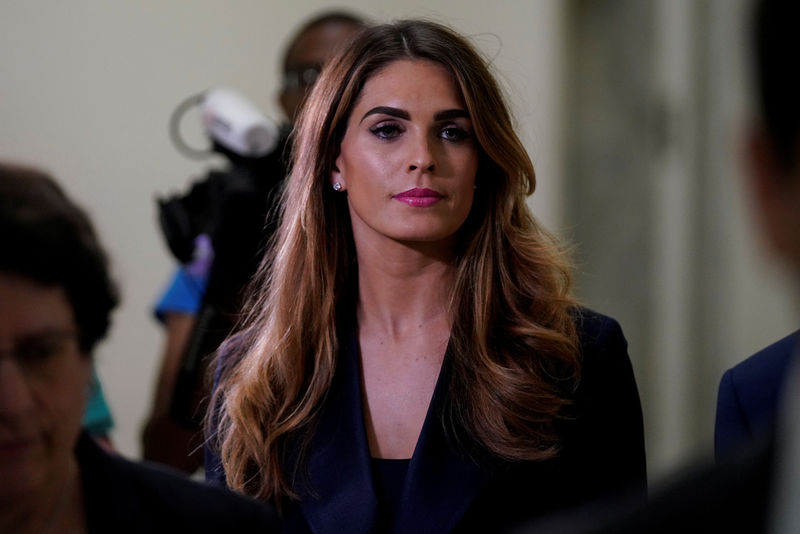By David Morgan and Jonathan Allen
(Reuters) - An attorney for former White House Communications Director Hope Hicks denied on Friday that she was involved in discussions during the 2016 presidential campaign about a hush-money payment to a porn star who claimed to have had a sexual encounter with President Donald Trump.
Her lawyer, Robert Trout, issued a statement a day after newly unsealed FBI documents raised new questions about Hicks' June 19 testimony to the U.S. House of Representatives Judiciary Committee. Hicks, formerly one of Trump's closest aides, told lawmakers she was never present for discussions between Trump and his former personal lawyer Michael Cohen about a payment to porn star Stormy Daniels.
"Reports claiming that Ms. Hicks was involved in conversations about 'hush money' payments on October 8, 2016, or knew that payments were being discussed, are simply wrong," Trout said in his statement on Friday. "Ms. Hicks stands by her truthful testimony that she first became aware of this issue in early November 2016, as the result of press inquiries, and she will be responding formally to Chairman Nadler's letter as requested."
At a judge's order, the government published on Thursday a 19-page section of its application in 2018 for a warrant to search Cohen's home and office that had previously been redacted. The new material cited several phone calls involving Hicks in support of the application.
The document suggested that Trump was actively involved in engineering the payment. But the president has denied having sex with Daniels, whose legal name is Stephanie Clifford, and said he had no knowledge at the time of payments to her.
House Judiciary Committee Chairman Jerrold Nadler sent Hicks a letter late on Thursday asking her to clarify her testimony in light of "apparent inconsistencies."
Another Democratic House panel chairman, Representative Elijah Cummings of the House Oversight and Reform Committee, wrote to Deputy U.S. Attorney Audrey Strauss of Manhattan on Friday to ask if prosecutors chose not to indict Trump over the hush payment, because of a Justice Department policy not to bring criminal charges against a sitting president.
Hicks was press secretary for Trump's presidential campaign in October 2016, the period during which the FBI document outlines how Cohen arranged to pay Daniels $130,000 to avert a scandal.
The campaign was already reeling from the release on Oct. 7 of the 2005 "Access Hollywood" tape in which Trump bragged about grabbing women by the genitals.
The document outlines several weeks of phone calls and text messages between Cohen, Trump officials and executives from the National Enquirer tabloid newspaper, many of which the government believed were about the payoff to Daniels.
Beginning on Oct. 8, 2016, there was a sharp uptick in calls between Cohen, Trump and Hicks as Cohen began negotiations with Daniels' lawyer to buy her silence, according to the FBI agent who wrote the document.
That evening, Hicks initiated what would become a four-minute, three-way call with Trump and Cohen, according to the document.
Cohen would have two further phone calls that evening with Hicks amid a flurry of calls with executives from American Media Inc, which publishes the National Enquirer and helped bury bad press for Trump by buying the rights to unflattering stories.
Before Oct. 8, Cohen had not spoken on the phone with Hicks for "at least" several weeks, the document said.
It said Cohen and Hicks spoke again for three minutes late on Oct. 28, the day after Cohen had made the $130,000 payment to Daniels' lawyer and as the final paperwork for the deal was being drawn up.
Cohen also spoke with Hicks and Keith Davidson, the lawyer for Daniels, multiple times on Nov. 4 after Trump's circle learned the Wall Street Journal was about to publish an article saying the National Enquirer had "shielded" Trump from allegations by former Playboy model Karen McDougal that she and Trump had had an affair. Trump has denied having an affair with McDougal.
Cohen had at least two more calls that evening with Hicks before the Journal story was published online, the FBI document said. The next morning, Cohen sent a text message to Hicks saying he felt the Journal story was getting "little to no traction."
"Same," Hicks texted back. "Keep praying!! It's working!"

Cohen is serving three years in prison after pleading guilty last year to breaking campaign finance laws through the hush-money scheme, as well as other financial crimes.